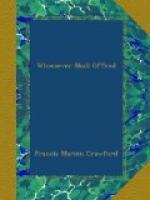“Yes,” answered the Professor, returning the glass tube to its case and the latter to his pocket. “But please to remember that although we can prove to our own satisfaction that some things really exist, we cannot prove that any imaginable thing outside our experience cannot possibly exist. Imagine the wildest impossibility you can think of; you will not induce a modern man of science to admit the impossibility of it as absolute. Impossibility is now a merely relative term, my dear Corbario, and only means great improbability. Now, to illustrate what I mean, it is altogether improbable that a devil with horns and hoofs and a fiery tail should suddenly appear, pick me up out of this delightful circle, and fly away with me. But you cannot induce me to deny the possibility of such a thing.”
“I am so glad to hear you say that,” said the Signora, who was a religious woman.
Kalmon looked at her a moment and then broke into a peal of laughter that was taken up by the rest, and in which the good lady joined.
“You brought it on yourself,” she said at last.
“Yes,” Kalmon answered. “I did. From your point of view it is better to admit the possibility of a mediaeval devil with horns than to have no religion at all. Half a loaf is better than no bread.”
“Is that stuff of yours animal, vegetable, or mineral?” asked Corbario as the laughter subsided.
“I don’t know,” replied the Professor. “Animal, vegetable, mineral? Those are antiquated distinctions, like the four elements of the alchemists.”
“Well—but what is the thing, then?” asked Corbario, almost impatiently. “What should you call it in scientific language?”
Kalmon closed his eyes for a moment, as if to collect his thoughts.
“In scientific language,” he began, “it is probably H three C seven, parenthesis, H two C plus C four O five, close parenthesis, HC three O.”
Corbario laughed carelessly.
“I am no wiser than before,” he said.
“Nor I,” answered the Professor. “Not a bit.”
“It is much simpler to call it ‘the sleeping death,’ is it not?” suggested the Contessa.
“Much simpler, for that is precisely what it is.”
It was growing late, according to country ideas, and the party rose from the table and began to move about a little before going to bed. The moon had risen high by this time.
Marcello and Aurora, unheeded by the rest, went round the verandah to the other side of the house and stood still a moment, looking out at the trees and listening to the sounds of the night. Down by the pool a frog croaked now and then; from a distance came the plaintive, often repeated cry of a solitary owlet; the night breeze sighed through the long grass and the low shrubbery.
The boy and girl turned to each other, put out their hands and then their arms, and clasped each other silently, and kissed. Then they walked demurely back to their elders, without exchanging a word.




